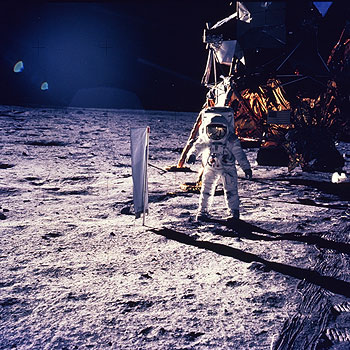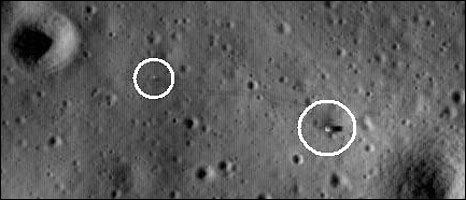To keen spacenuts like yours truly, the moonshot was a brilliant climax. That was the problem, it was THE climax. Nothing since has some close in daring or accomplishment. The moon, the wisemen told us, was only the first step. Mars was next, by 1990 surely. 1990 came and went. Whatever the scientific merits of sending men rather than machines to the planets, the spacenuts wanted Captain Kirk to follow logically from Neil Armstrong. It was the future. It was progress. It was inevitable.
We didn’t notice, until rather late, the problem with Apollo. The clever crew cut men, hard cold and objective, gazing at their computer screens — ancient to modern eyes, but so beautiful — using mind boggling math to do the amazing. Beneath the math, the engineering and the hard science was the dismal science. Apollo was a government boondoggle, a creature of politicians it died when its political masters saw that it was no longer a vote getter.
Publius, “Destination Moon”, Gods of the Copybook Headings, 2009-07-20
July 21, 2009
QotD: ” . . . Apollo was a government boondoggle”
July 20, 2009
That’s one small miscue for a man, one giant leap for Mankind
It was 40 years ago:
Armstrong and fellow astronaut Buzz Aldrin left the Apollo 11 command module (piloted by Michael Collins) in orbit and performed a landing in the lunar module Eagle. At 4:18 p.m. EDT, Armstrong announced to a watching and waiting world that “The Eagle has landed.”
Six-and-a-half hours later, he stepped onto the powdery surface with the words, “That’s one small step for man, one giant leap for mankind.” Aldrin soon followed Armstrong down the ladder to become the second man to stand on the moon.
The mission was by no means a slam dunk. There was real fear that once on the lunar surface the astronauts might end up marooned and beyond rescue. In fact, President Nixon had a condolence speech ready to go in the event things turned out badly.
Nostalgia is an interesting phenomenon . . . the very term “President Nixon” is pried out of deep archaeological layers of memory, yet the first moon landing still seems fresh and no-longer-new but still somehow “recent”.
If you’re still eager for more, Wired has a convenient round-up of Apollo 11-related sites and events.
July 18, 2009
Photos from Lunar orbit show Apollo 14 landing site
BBC News has an article today on some recent photos taken by the Lunar Reconnaissance Orbiter (LRO), showing the site of the Apollo 14 landing:
Science instruments (circled left) and the lunar module lower stage (circled right) are connected by a footprint trail
A US spacecraft has captured images of Apollo landing sites on the Moon, revealing hardware and a trail of footprints left on the lunar surface.
The release of the images coincides with the 40th anniversary of the first manned mission to land on the Moon.
The descent stages from the lunar modules which carried astronauts to and from the Moon can clearly be seen.
The image of the Apollo 14 landing site shows scientific instruments and an astronaut footpath in the lunar dust.
It is the first time hardware left on the Moon by the Apollo missions has been seen from lunar orbit.
July 15, 2009
It’s been 40 years . . . why haven’t we gone back?
On July 20th, it will have been 40 years since many of us clustered around our tiny black-and-white televisions, watching the first moon landing (or for those of you of conspiracist leanings, a really convincing sound stage in Area 51). Why, after all this time, haven’t we gone further? Why, for that matter, have we not been back to the moon for over a generation? Ronald Bailey explains the real reason:
The Apollo moon landings have often been compared to the explorations of Christopher Columbus and the Lewis and Clark expedition to Oregon. For example, on the 20th anniversary of the first moon landing, President George H.W. Bush declared, “From the voyages of Columbus to the Oregon Trail to the journey to the Moon itself: history proves that we have never lost by pressing the limits of our frontiers.”
But what boosters of the moon expeditions overlook is that the motive for pressing the limits of our frontiers in those cases was chiefly profit. In his report from his first voyage, Columbus predicted that his explorations would result in “vast commerce and great profit.” The extension of commerce was also the chief justification that President Thomas Jefferson gave in his secret message to Congress requesting $2,500 to fund what would become the Lewis and Clark expedition.
Forty years later, as we bask in the waning prestige that the Apollo missions earned our country, we must keep in mind that humanity will some day colonize the moon and other parts of the solar system, but only when it becomes profitable to do so.
Back in 1969, my friend Alan Fairfield and I sat in fascination (at least in the golden memory, they do . . . we were nine: I doubt that we paid as much attention to the broadcast as his mother thought we should). Mrs. Fairfield told us that we’d be able to go to the moon ourselves by the time we were grown up. It didn’t turn out that way, and at the current rate of progress, it may not turn out that way for my grandkids.
But I still hope, one day . . .
(Cross-posted to the old blog, http://bolditalic.com/quotulatiousness_archive/005583.html.)
July 14, 2009
Random links of possible interest
Just a few links to provide you with click-therapy:
- China decides that electro-shock therapy isn’t appropriate for treating “internet addiction”. No word on whether they’ve invested in Tasers instead.
- Simona Halep ignores an online petition and decides to promote her sports career over the interests of thousand of pasty internet geeks.
- Apollo 11 experience recreated on the web.
- I can’t possibly improve on this article’s title: Pic of the Day (Mid-1930s’ Edition): Economic Suicide Girls Get Tattooed For the NRA!

Sure hope those were temporary tattoos!
- Tim Cavanaugh fisks Timothy Geithner.
- Auto Czar abdicates.
- An over-the-top analysis of why there is a Gender Gap among American voters (link via Gerard Van der Leun).
- Survey shows that one in six people too dumb to be allowed out on the internet by themselves.
(Cross-posted to the old blog, http://bolditalic.com/quotulatiousness_archive/005579.html.)





